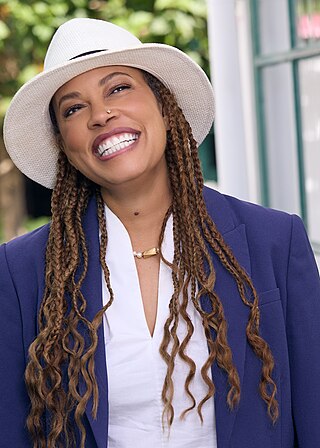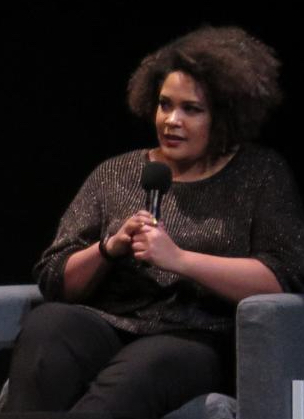Related Research Articles

Intersectionality is an analytical framework for understanding how a person's various social and political identities combine to create different modes of discrimination and privilege. Intersectionality identifies multiple factors of advantage and disadvantage. Examples of these factors include gender, caste, sex, race, ethnicity, class, sexuality, religion, disability, weight, and physical appearance. These intersecting and overlapping social identities may be both empowering and oppressing. However, little good-quality quantitative research has been done to support or undermine the theory of intersectionality.

Patricia Hill Collins is an American academic specializing in race, class, and gender. She is a distinguished university professor of sociology emerita at the University of Maryland, College Park. She is also the former head of the Department of African-American Studies at the University of Cincinnati, and a past president of the American Sociological Association (ASA). Collins was the 100th president of the ASA and the first African-American woman to hold this position.
Black feminism, also known as Afro-feminism chiefly outside the United States, is a branch of feminism that centers around black women.

Barbara Smith is an American lesbian feminist and socialist who has played a significant role in Black feminism in the United States. Since the early 1970s, she has been active as a scholar, activist, critic, lecturer, author, and publisher of Black feminist thought. She has also taught at numerous colleges and universities for 25 years. Smith's essays, reviews, articles, short stories and literary criticism have appeared in a range of publications, including The New York Times Book Review, The Black Scholar, Ms., Gay Community News, The Guardian, The Village Voice, Conditions and The Nation. She has a twin sister, Beverly Smith, who is also a lesbian feminist activist and writer.

France Winddance Twine is a Black and Native American sociologist, ethnographer, visual artist, and documentary filmmaker. Twine has conducted field research in Brazil, the UK, and the United States on race, racism, and anti-racism. She has published 11 books and more than 80 articles, review essays, and books on these topics.

Kimberlé Williams Crenshaw is an American civil rights advocate and a leading scholar of critical race theory. She is a professor at the UCLA School of Law and Columbia Law School, where she specializes in race and gender issues.

Ecofeminism is a branch of feminism and political ecology. Ecofeminist thinkers draw on the concept of gender to analyse the relationships between humans and the natural world. The term was coined by the French writer Françoise d'Eaubonne in her book Le Féminisme ou la Mort (1974). Ecofeminist theory asserts a feminist perspective of Green politics that calls for an egalitarian, collaborative society in which there is no one dominant group. Today, there are several branches of ecofeminism, with varying approaches and analyses, including liberal ecofeminism, spiritual/cultural ecofeminism, and social/socialist ecofeminism. Interpretations of ecofeminism and how it might be applied to social thought include ecofeminist art, social justice and political philosophy, religion, contemporary feminism, and poetry.

Ruth Wilson Gilmore is a prison abolitionist and prison scholar. She is the Director of the Center for Place, Culture, and Politics and professor of geography in Earth and Environmental Sciences at The City University of New York. She has been credited with "more or less single-handedly" inventing carceral geography, the "study of the interrelationships across space, institutions and political economy that shape and define modern incarceration". She received the 2020 Lifetime Achievement Award from the American Association of Geographers.

Dragon Ladies: Asian American Feminists Breathe Fire is a book edited by Sonia Shah, published in 1997. The work contains a preface by Yuri Kochiyama and a foreword by Karin Aguilar-San Juan. The book is divided into four parts: Strategies and Visions, An Agenda for Change, Global Perspectives, and Awakening to Power, consisting of a collection of 16 essays and interviews by Asian American writers, artists and activists presenting their views on feminism.
Multiracial feminist theory is promoted by women of color, including Black, Latina, Asian, Native American, and anti-racist white women. In 1996, Maxine Baca Zinn and Bonnie Thornton Dill wrote “Theorizing Difference from Multiracial Feminism," a piece emphasizing intersectionality and the application of intersectional analysis in feminist discourse.
White feminism is a term which is used to describe expressions of feminism which are perceived as focusing on white women but are perceived as failing to address the existence of distinct forms of oppression faced by ethnic minority women and women lacking other privileges. The term has been used to label and criticize theories that are perceived as focusing solely on gender-based inequality. Primarily used as a derogatory label, "white feminism" is typically used to reproach a perceived failure to acknowledge and integrate the intersection of other identity attributes into a broader movement which struggles for equality on more than one front. In white feminism, the oppression of women is analyzed through a single-axis framework, consequently erasing the identity and experiences of ethnic minority women the space. The term has also been used to refer to feminist theories perceived to focus more specifically on the experience of white, cisgender, heterosexual, able-bodied women, and in which the experiences of women without these characteristics are excluded or marginalized. This criticism has predominantly been leveled against the first waves of feminism which were seen as centered around the empowerment of white middle-class women in Western societies.

Ijeoma Oluo is an American writer. She is the author of So You Want to Talk About Race and has written for The Guardian,Jezebel, The Stranger, Medium, and The Establishment, where she was also an editor-at-large.

Loretta J. Ross is an African American academic, feminist, and activist who advocates for reproductive justice, especially among women of color. As an activist, Ross has written on reproductive justice activism and the history of African American women.

Carceral feminism is a critical term for types of feminism that advocate for enhancing and increasing prison sentences that deal with feminist and gender issues. It is the belief that harsher and longer prison sentences will help work towards solving these issues. The phrase "carceral feminism" was coined by Elizabeth Bernstein, a feminist sociologist, in her 2007 article, "The Sexual Politics of the 'New Abolitionism'". Examining the contemporary anti-trafficking movement in the United States, Bernstein introduced the term to describe a type of feminist activism which casts all forms of sexual labor as sex trafficking. She sees this as a retrograde step, suggesting it erodes the rights of women in the sex industry, and takes the focus off other important feminist issues, and expands the neoliberal agenda.
Gail Lewis is a British writer, psychotherapist, researcher, and activist. She is Visiting Senior Fellow in the Department of Gender Studies at the London School of Economics, and Reader Emerita of Psychosocial Studies at Birkbeck College. She trained as a psychodynamic psychotherapist at the Tavistock Clinic.

Aph Ko is an American writer, vegan activist, and digital media producer. She is the author of Racism as Zoological Witchcraft: A Guide to Getting Out (2019), co-author of Aphro-ism: Essays on Pop Culture, Feminism, and Black Veganism from Two Sisters (2017), and creator of the website Black Vegans Rock.
Feminism and racism are highly intertwined concepts in intersectional theory, focusing on the ways in which women of color in the Western World experience both sexism and racism.
Mikaela Loach is a climate justice activist based in Edinburgh, Scotland. She was a medical student at the University of Edinburgh who uses social media for campaigning.
Athlete activism in the United States refers to using one's platform as a professional athlete to advocate for social and political issues. It has been a prominent aspect of American sports culture for decades, dating back to the civil rights movement of the 1960s, with athletes such as Muhammad Ali and Tommie Smith using their fame to speak out against racism and discrimination. In recent years, athlete activism has gained renewed attention as athletes have used their platforms to address issues such as police brutality, racial inequality, and LGBTQ rights. The intersection of sports and social justice has been a contentious topic, with some praising athletes for using their influence to bring attention to important issues while others criticize them for being "political" or "divisive."
Vera Kurtić is a Romani feminist activist and writer from Serbia, She is the author of the book Džuvljarke: Roma Lesbian Existence, which is the first book to discuss non-heteronormative Roma women's sexuality.
References
- 1 2 3 4 Ross, Janell (11 May 2023). "The Radical Joy of Rachel Cargle". Time . Retrieved 13 August 2023.
- 1 2 3 Dirshe, Siraad (June 18, 2020). "'Dear White Women': The Public Classroom of Rachel Cargle". The New York Times . Retrieved 22 June 2020.
- 1 2 3 Justice, Camryn (22 April 2021). "Voice of change: How Akron native Rachel Cargle became a globally known activist, author and speaker". WEWS-TV . Retrieved 13 August 2023.
- 1 2 3 4 5 Meltzer, Marissa (September 11, 2019). "I Refuse to Listen to White Women Cry". The Washington Post . Retrieved 22 June 2020.
- ↑ Valenti, Lauren (24 June 2020). "6 Organizations That Support Black Women's Health—And Why the Work They're Doing Is So Essential". Vogue . The Loveland Foundation: Condé Nast. Retrieved 7 July 2020.
- ↑ Grady, Constance. "Why the author of Girl, Stop Apologizing had to apologize twice in a week". Vox . Retrieved 6 May 2021.
- ↑ Nyorkor, Sia (11 December 2020). "The Next 400: Activist & author Rachel Cargle opens bookstore to amplify marginalized voices". Cleveland 19 . Retrieved 6 May 2021.
- ↑ "Rachel Cargle". MaConferenceForWomen.org. Retrieved 13 August 2023.
- ↑ McCarthy, Joe (12 June 2020). "14 Racial Justice Activists & Authors You Should Know". Global Citizen . Retrieved 13 August 2023.